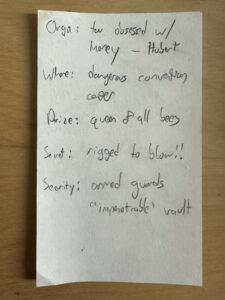Umpteenth in an occasional series discussing games I might ilke to run or play someday. What’s on my mind in 2025? In no particular order…
- Nahual has been on my list for a while now. It’s a really cool adaptation of a Mexican graphic novel. The Kickstarter had a translation of the original material as a stretch goal, but you know how those go sometimes. Anyhow: it’s interestingly rebellious urban fantasy about shapeshifters who hunt angels to make a living in Mexico City. Needs to be a campaign because the journey of becoming a more adept shapeshifter is a pretty key part of the rules, and the setting is about community which means it also benefits from time to breathe. Somewhat more inclined to run this because it’s a world I’d enjoy riffing on.
- Legacy: Life Among the Ruins is an odd choice in a way. I’m not compelled by the setting which is fairly generic post-apocalypse material. It’s sort of more a toolkit setting — you can make of it what you will, but you have to put that effort into it. However, the generational style of play is fascinating for me. Also obviously a campaign. I’d run or play.
- Outgunned is so high on my list of one-shots I can’t even say. I want to find out first hand if the action mechanics are good; word of mouth is strong. I could use a more flexible version of Feng Shui in my toolkit. One-shot, or maybe one scenario’s worth of play over a couple of sessions, since the whole point is finding out if I like it. I do have a campaign floating around in my head set in a Madripoor pastiche, complete with street level superheroes and mad science, and the existing superhero rules for the game would do just fine even before the upcoming superhero-specific book, but let’s not get ahead of ourselves. Happy to run this.
- The Troubleshooters is occupying a similar place in my head except it’s more that Tintin nostalgia is strong in me. Pulpy 1965, you bet! Nice d% system that won’t get in the way, Jet Age coolness, etc. I would really dig playing this, I think.
- Worldwide Wrestling is fun. I’ve run it once; I’d be into running a year’s worth of events in my PNWage Wrestling promotion. (Man, past me put in the work to make that writeup usable, thanks!)
- Trophy one of these days. Specifically Trophy Dark, I don’t need the campaign play here. And I wanna play this, not run it. I mean I could run it but I’m interested in how it feels at the other side of the table. I did play Trophy Gold once but the scenario never got finished, which was a bit frustrating.
- Agon or a derivative, but probably Agon. I like getting the pure form of an exciting design. You could talk me into Deathmatch Island. I am more interested in this as a player than as a GM, because I’m interested in the competitive aspects and I don’t want the extra effort of nudging players in that direction. But, you know, with the right group…
